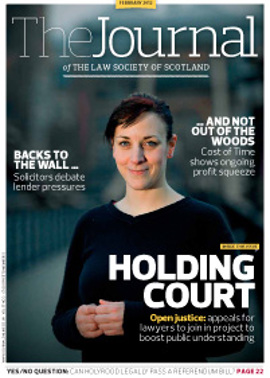Room at the top

Moving in-house as a career choice can seem quite a challenge for lawyers. How will they adapt? Will they fit in? Do they have the relevant skills? And you don’t often see a partner at a “Big Four” firm stepping directly across to a senior management role in local government.
Any doubts did not deter Alastair Maclean, who two years ago moved from corporate partner at Maclay Murray & Spens to head of legal and administration at Edinburgh City Council – since progressing further to Director of Corporate Governance.
All before he turns 40. Admitting to having followed a “non-standard” career route (from commercial property work as a NQ, to commercial, then corporate, with financial services, unit trusts, joint corporate ventures, and mergers in the life sector thrown in), Maclean says he “had it in mind that by the time I was 40 I would cease to be a private practice lawyer and would be out there doing commercial things”.
This post wasn’t quite what he had thought of. “To be honest, initially I was sceptical, I wasn’t sure this was the way I wanted my career to go; but I came along for the interview and I was sold, absolutely sold.”
Why? “When you see the breadth of things this organisation does, and the challenges it faces, that was what sold it to me. Real challenge, really exciting things, that make you want to get out of bed, things you wouldn’t normally see in private practice or as a professional.”
Off the rails?
The first word the public associates with Edinburgh Council is probably “trams”, though the recent housing repairs scandal has also grabbed its share of headlines. How does Maclean react to the “City in crisis” type of headline? “I couldn’t disagree more. I think there’s a fantastic leadership in this council, and there have been major changes, with retirements and with Sue Bruce coming in as chief executive just over a year ago.” (Someone who has been making her mark, by all accounts.) “So there’s a very clear direction from the officers. And there’s very good engagement I think with the politicians.”
He adds: “I would not have applied for the job unless I had thought this organisation was going forwards. And I genuinely believe it is and that’s one of the reasons I was interested in this role.”
It wasn’t long before his corporate skills were called on to direct the merger of the then finance and corporate services departments into the single directorate he now heads – which, he maintains, was not driven primarily by financial pressures.
“It so happened that the two directors retired about the same time, so it made sense to pull them together into one corporate governance department... Right now I’m working on how that will be done. I’ve no doubt there will be some cost efficiencies, but the main reason is to have a tighter, streamlined core governance department that can provide efficient services to other departments so that they can deliver frontline services better.”
Maclean’s name can be found on a report to the Audit Commission on the council’s performance indicators, available online, the breadth of which makes his job sound almost like a chief executive’s role in itself.
“Very far from it!” he laughs. In fact, his is only one of five directorates under Sue Bruce, along with Children and Families, City Development, Health and Social Care, and Services for Communities. “Her job is to pull us all together and make sure the council is providing its public services externally, and my role is to assist in delivering those services.”
Search for efficiency
Finance being within his remit, Maclean admits that the pressure to save money is one of his first priorities. “It’s right up there; there are many things at the top of the agenda, but it’s no secret that this council and all councils have got challenging financial times ahead.”
And that means looking at new ways of delivering services. Here, competing political priorities on the council come into play, with members even of the jointly-governing Liberal Democrat and SNP groups taking different positions. Since our interview, a proposed “alternative business models” programme, with greater private sector involvement, has been voted down. “Whatever the outcome”, Maclean told me, “this council needs to look at a number of ways of commissioning services, and there are many ways. It can be done purely internally, through outsourcing, or by various different hybrids.
"We need to make sure we get efficient delivery of service for a good price that delivers our final outcomes, and I’m not wedded, the corporate management team isn’t wedded and I don’t think our councillors are either, to any particular approach. We need to look at a whole raft of things.”
An ambitious plan for shared services among a number of west of Scotland councils fizzled out last year for lack of support. Does Maclean see a place for such sharing?
“There should be a role for that. I would go so far as saying I’m maybe frustrated that it hasn’t happened more. We have 32 councils in Scotland, and we should be seeking to get as many councils working together as we can. And this council does work with others.”
He mentions insurance and pensions as areas where Edinburgh is sharing knowledge and expertise.
“It’s not as uniformly tied up as maybe it could be, but if there are opportunities to share services between councils, to learn from each other, that’s exactly what we should be doing.”
Put it to the panel
What of legal services? Here, Maclean has been ringing the changes. Surprisingly, until a year ago Edinburgh had never tendered for external advisers, but Maclean saw the need to engage more with private legal firms for capability and especially capacity reasons. Now he has a panel of six or seven firms and has exercised an option to keep it running for a second year. “It’s very competitive and it’s very useful for when we haven’t got the expertise internally. We have some very able people, but the legal problems we’re getting nowadays are so disparate that we can’t do everything ourselves, and I think it’s important for the internal team to focus on what it’s good at, and when it needs external help to get it. It’s now able and willing to engage with the legal sector and I think that’s healthy, and healthy for the profession.”
He admits to having learned something from the experience. “I thought I was quite good at working out what clients wanted, but when you become a client, so to speak, you see different things. It’s true what people say, that you almost take for granted that the lawyers you use have the legal knowledge, and what you’re looking for is a relationship, one where both people know what the other wants. I can get a pure legal answer, but it’s how I apply it, that’s the answer I need.”
We are less likely to see the further step, being followed by Kent and Birmingham Councils in England, of having the legal team bid against private firms for outside work. “I feel that what an in-house legal team should be doing is providing an efficient service, or getting help from external sources if that’s what’s needed, to enable the business, or the service areas if you like, to deliver frontline services.”
Balancing skills
Other matters call for more urgent review. One of the councillors on the board of TIE, the company in charge of the trams development, was widely reported in the press as saying that board members did not have the skills to run such a major project. Although he was referring specifically to legal and technical expertise, the issue still has relevance for the future. Maclean is on the case. “I am a corporate lawyer and we have lots of companies in this organisation, so we do need to look at that, that we’ve got it right. Against that we also need to make sure that we enable the politicians to direct the policy, the strategy, and to scrutinise us: that's their job. It’s a difficult balancing act. A local authority is a complex beast; we’re looking at it, but I can’t predict the outcome right now.”
Within the council, a four-step process takes place in order to reconcile good governance with democratic representation. Officers advise on policy; politicians set the policy; officers implement the policy; and politicians scrutinise it. “Clearly nothing is ever that simple and there are challenges around that, but we give our recommendations, our elected members say yes or no, and we have to do that. There have been decisions in the past where members have chosen not to follow officers’ advice, and that’s right and proper, if that’s what they think is the right thing to do. I’ve got a clear view of our job as officers, and hopefully that’s what we’re doing.”
The Journal’s recent employment survey (December 2011, 12) showed a stark contrast within the profession regarding predictions as to prospects for their employer in 12 months’ time, the public sector being overwhelmingly negative compared with a more neutral outlook in private practice. Maclean is not too surprised, the latter having been hit earlier by the recession and being closer to coming through the other side, whereas the public sector “might feel they don’t yet see the future”.
As for where he sees himself going next, “I really like this job. I’m only a few months into it but it’s so broad ranging, it enables me to apply both my legal and my commercial skills.” Having been someone who “used to know exactly where I was going and why”, he is now “just going for what seems like a challenge that I’m enjoying”.
It was commented at the last In-house Lawyers Group conference that relatively few lawyers are making it to top jobs in local government these days. Maclean sees no reason why they can’t. “Local government needs lots of people with lots of different skills, but lawyers’ analytical, problem solving, and commercial skills have got to be effective.”
Having perhaps been in the right place at the right time, he has no regrets about his move. “I think there’s more than enough to do and more than enough challenge... I’d like to hope I’ll still be here for a good while to come.”
In this issue
- Credit hire: a tug of war?
- As others see them
- Taking care of the dead
- Act like a trustee, think like a fund manager
- Beating the stress bug
- Reading for pleasure
- John McNeil, CBE, WS: an appreciation
- Opinion column: Open Justice
- Council profile
- Book reviews
- President's column
- On the move
- Between a rock and a hard place
- Tough times are still ahead
- Care: a new direction
- Officer class
- Open questions
- Fuller benches
- The limits of hearsay
- If you don't ask, you don't get?
- Fees: not so simple?
- Easing the debt block
- Registering our concerns
- Room at the top
- The best of times, the worst of times
- Law reform roundup
- Work and Cancer: employers’ toolkit
- From the Brussels office
- Post with caution
- Ask Ash
- The learning curve
- Business checklist
- Hear us, we say






